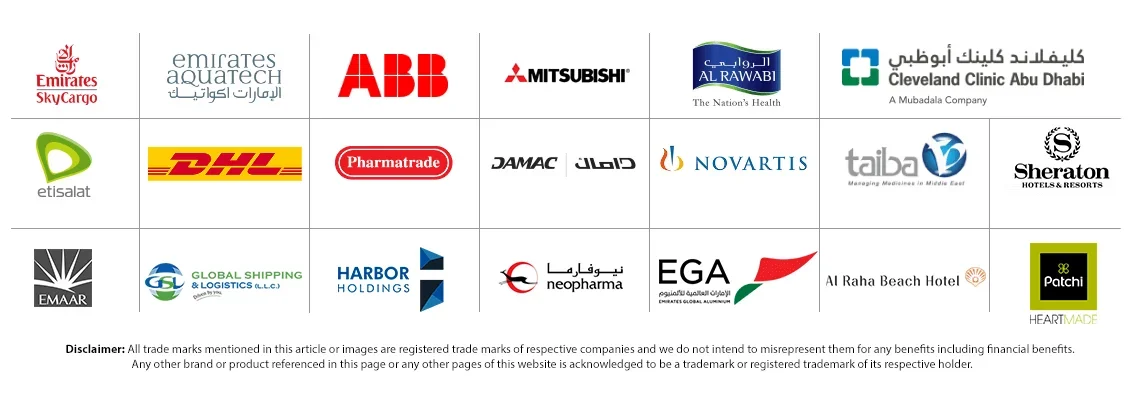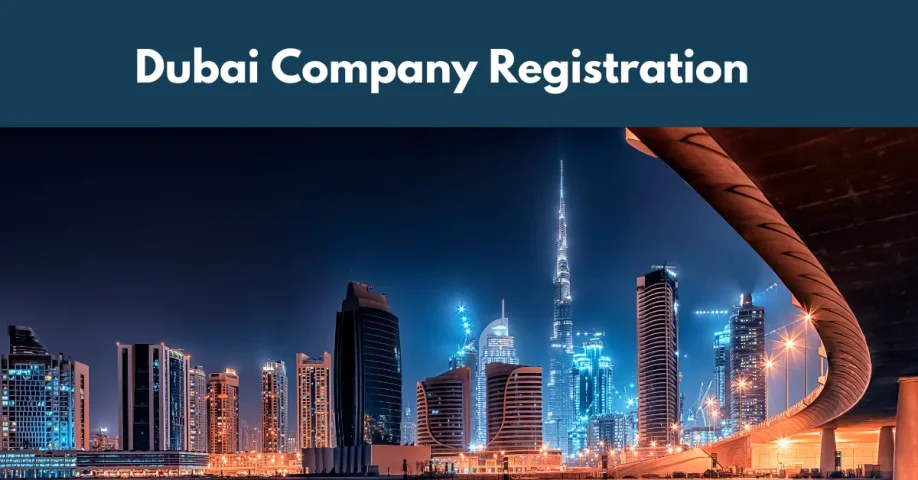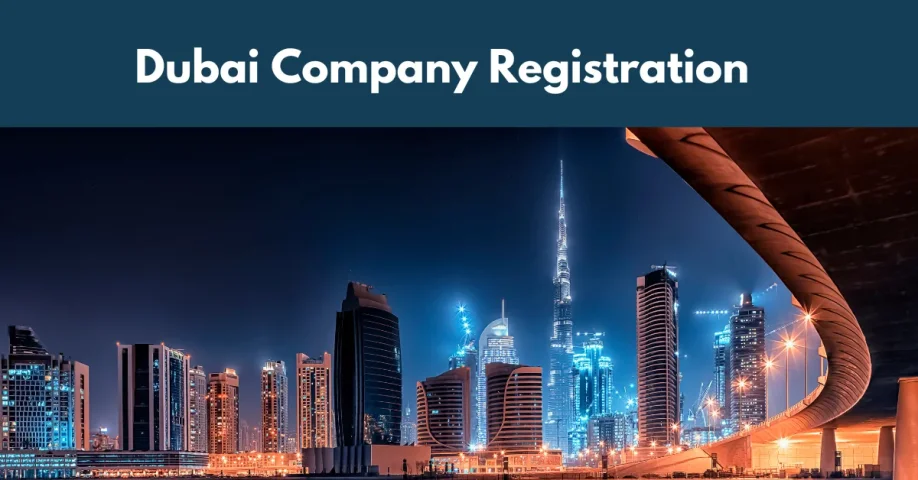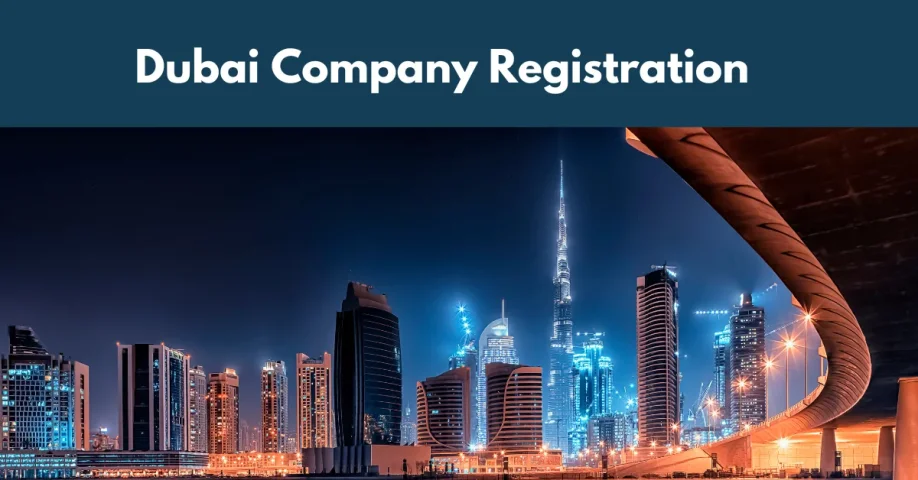UAE Company Registration is a great choice when you want to set-up an offshore company in the Middle East. The United Arab Emirates, particularly Dubai, offers the Dubai Free Zone Registration. It is a business capital, and setting up a company there can bring you benefits. Here is a breakdown of the UAE Company Registration, the registration process and its benefits.

Under the Licensing Section of the Dubai Department of Economic Development (DED), the company will create an inventory, trade name and various ownership identities. The company must meet the approval of the licensing section of the DED in order to register their company.
UAE offers the Dubai Free Zone. The Dubai Free Zone allows foreigners to have tax-free business opportunities in certain areas of the Emirate.

Ease of succeeding in business and the top-notch infrastructure are some of the main reasons wherefore so many startups and entrepreneurs choose Dubai. The UAE have managed to understand what the business world needs, so the country offers a well sought-after environment for business.
Those interested in starting a business can stop searching because Dubai offers a unique business climate.
There was no personal income tax in the UAE. The prime minister of the UAE and the head of Dubai has actually said few years ago that his country will never adopt an income tax, even if the country will go through an actual deficit.
Fast forward to 2023 and the news about a corporate tax in UAE started spreading. Today, there's a 9% corporate tax for companies making more than AED375,000, while those making less will still pay nothing. There's more to this tax, as well as exceptions, but overall, there are still ways to bypass it. The UAE is still a good place to do business in.
So yes, you’re less likely to face an individual income tax in Dubai, but there’s a trick. If you live in Dubai and you’re a tax resident somewhere else, you’ll have to pay your tax there.
There’s an old misconception claiming that the oil is responsible for the low tax system in Dubai. Wrong! In fact, Abu Dhabi is the main place relying on oil and gas income. Overall, only 1% of the GDP in Dubai comes from oil. Tourism and business generate more income.
But then again, taxes do exist in Dubai. Energy firms, international banks, hotels, alcohol and properties are taxed, just to give you a few examples.
Small businesses don’t pay anything based on their profits (up to AED 375,000), middle businesses pay 9% (above AED 375,000) and large multinationals have a custom tax rate. It’s still lower than what you’ll get in most countries.
From massive investments and economic power to economic diversification and a stable regime, all these things do contribute to the environment.
Dubai caters for all the economies in the MEASA area, covering more than three billion residents and an amazing range of financial services. The best part about it? Everything is regulated in an effective manner, only to leave no room for mistakes and problems.
Now, everyone coming to the UAE is educated, mainly because you can't survive otherwise. The same goes for foreigners. To get a visa, you'll need some sort of education, or you won't be able to get in.
Obviously, there’s also a category of non-educated workers handling jobs that simply don’t require much education, such as particular levels in construction.
On top of all these, setup costs are lower when compared to other jurisdictions. That’s one of the things that attracts potential business people to Dubai.

Going on the government website, you’ll be able to register a company in Dubai in no time. There are different procedures based on how you want to do it. You can do it online or in person. Online is obviously quicker.
However, there are slightly different procedures if you register in the free zone or on the mainland. Here are the procedures for both of them in person.
Determine the business activity
This is the first step in the process. The government allows you to choose between commercial trade, consultancy services, industrial, educational, media, ecommerce, offshore, freelancer, warehousing, manufacturing, innovation and others.
Pick the legal structure
During this second step, the government allows you to pick between a free zone company (FZ Co.), a free zone limited liability company (FZ LLC) and a free zone establishment (FZE).
Each structure has its own requirements. It also defines the laws your company must adhere to, so it’s important to understand the outcome of your selection.
Register the trading name
There are quite a few rules here, such as picking something unique, avoiding abbreviations of legal structures or deciding on something that’s related to the economic activities of the business. They make common sense though.
Pick a location
There are over 40 free zones in the UAE, each with its own advantages. You can buy or rent, but virtual offices are also accepted. The authority of the free zone of choice will determine the required space based on the business activity and number of employees.
Most people choose to rent, though. Keep in mind that some offices are partially or fully furnished.
Get the original approval
Get all the required documents in place and remember, some ideas, such as tourism, may require more documents than others. The documents you need to submit depend on the authority you pick and the local regulations. Here’s a common list of what you’ll normally be asked for:
Finally, make the registration and pay the fees.
Additional steps may also be over a residency visa, not to mention a bank account. Get the visa from the authority you pick. As for the bank account, there are plenty of good choices.
Determine the business activity
There are six main types of licenses for businesses, occupational, tourism, industrial, commercial, agricultural and professional. There are also over 2,000 economic activities to choose from once you pick the license type.
Pick the legal structure
There are nine legal forms to choose from. Once again, you’ll have to determine which one suits your business model.
You can choose between sole establishment, civil company, limited liability company, public or private joint stock company, branch of a GCC or local company, holding company or representative office of a foreign company.
Register the name
The name you trade under shouldn’t have any legal abbreviations, inappropriate or offensive words, names of rules, governments or official entities. It should be unique and not even similar to other businesses’ names.
Get approved
The initial approval means the government has no objections against what you’ve done so far, all the work in the previous steps. The approval will also allow you to proceed with the application and go for the actual license.
Get the MOA or LSA
MOA stands for Memorandum of Association. It’s necessary in certain situations. If you run a shareholding company (whether private or public), a limited liability company or a civil company, you need this legal form.
On the other hand, if you're after a sole proprietorship, you need a LSA (Local Service Agent agreement).
Decide on the business location
A physical address is mandatory for a business in the UAE. While most zones have similar rules and requirements, make sure you comply with them. In Dubai, for example, the tenancy contract for warehouses or offices should be registered over the Ejari portal.
The portal is operated by the Dubai Land Department.
Get additional approvals
This isn’t a general rule, as it depends on your economic activities. Some activities require further approvals though.
Documents include the original approval you received earlier, as well as the lease contract, MAS if needed and approvals from various governmental entities, depending on the business, industry and possible requirements.
Pay all the fees
Get all the fees in. Once the money is in, you’ll be able to collect your license. You can do it in person or online.
Sign up with the Chamber of Commerce and Industry
To register, you’ll need the entity in the emirate you’ve picked. Each emirate has its own department, so if you go for Dubai, pick the one in Dubai, available at Dubai Chamber of Commerce
Overall, the process takes around two weeks.
You can also do it in as little as 15 minutes online.
How to start a business in the UAE online in 15 minutes
The electronic Basher service available at BASHER gathers together all the departments and offices you need to register a business, all of them working together in a very tight collaboration.
There are seven different departments in one place only.
On average, get ready to pay around AED 20,000 for a normal business.
The same rule applies to businesses. Documents must be checked for authenticity. Licenses and other documents must be checked one by one too.
Furthermore, each bank has its own rules and policies. If you’re not used to the local banking system, you may find it quite frustrating.
Throw in the language barrier and the demand for new accounts, too, and it makes sense. Opening a bank account for a company in Dubai can be a challenge.
Some banks do allow opening accounts without being there in person, as well.
The main option to open an account without going there in person is to visit a local branch. If a major international chain bank operates in your country and conducts business in Dubai too, you’ll be able to get an account in there.
At the same time, Dubai allows financial officers (or agents) to do things in your name. However, not every bank accepts this. In some cases, you might be able to get an agent to do everything for you. In others, you may have to go there with an agent for convenience.
If you do rely on a financial officer, they should be able to direct you towards banks that can meet your requirements.

While these businesses can certainly help, the list is much longer, though. A few other names to include among your potential choices include:
Definition of UAE Company Registration
UAE Company Registration refers to the registration of a company. The said company has to get through the preliminary approvals.Under the Licensing Section of the Dubai Department of Economic Development (DED), the company will create an inventory, trade name and various ownership identities. The company must meet the approval of the licensing section of the DED in order to register their company.
Why UAE Company Registration is the hottest trend for businesses?
The United Arab Emirates is the business capital of the Middle East. Hence, it has business laws and jurisdictions that make enticing offers for foreign business owners. With due process, a business owner can file a civil company under UAE law. The UAE law allows businesses to be foreign-owned, and at the same time, owned or sponsored by a local citizen. This is called UAE LLC.UAE offers the Dubai Free Zone. The Dubai Free Zone allows foreigners to have tax-free business opportunities in certain areas of the Emirate.
Benefits of setting up a company in Dubai
Ease of succeeding in business and the top-notch infrastructure are some of the main reasons wherefore so many startups and entrepreneurs choose Dubai. The UAE have managed to understand what the business world needs, so the country offers a well sought-after environment for business.
Those interested in starting a business can stop searching because Dubai offers a unique business climate.
Zero tax regime
Dubai is a zero tax regime, but it depends what you do. Some see it as a tax free environment, yet there are some circumstances. There will be times when you may need to pay a tax, so it’s imperative to know everything upfront.There was no personal income tax in the UAE. The prime minister of the UAE and the head of Dubai has actually said few years ago that his country will never adopt an income tax, even if the country will go through an actual deficit.
Fast forward to 2023 and the news about a corporate tax in UAE started spreading. Today, there's a 9% corporate tax for companies making more than AED375,000, while those making less will still pay nothing. There's more to this tax, as well as exceptions, but overall, there are still ways to bypass it. The UAE is still a good place to do business in.
So yes, you’re less likely to face an individual income tax in Dubai, but there’s a trick. If you live in Dubai and you’re a tax resident somewhere else, you’ll have to pay your tax there.
There’s an old misconception claiming that the oil is responsible for the low tax system in Dubai. Wrong! In fact, Abu Dhabi is the main place relying on oil and gas income. Overall, only 1% of the GDP in Dubai comes from oil. Tourism and business generate more income.
But then again, taxes do exist in Dubai. Energy firms, international banks, hotels, alcohol and properties are taxed, just to give you a few examples.
Small businesses don’t pay anything based on their profits (up to AED 375,000), middle businesses pay 9% (above AED 375,000) and large multinationals have a custom tax rate. It’s still lower than what you’ll get in most countries.
Safe and solid government
There are all kinds of rankings and statistics out there, and many of them are difficult to check. While some claim the UAE might lead the world, most others put the country among the front runners. From around 200 countries out there, it's safe to say that the UAE can easily rank among the top 10 economies.From massive investments and economic power to economic diversification and a stable regime, all these things do contribute to the environment.
Top-notch financial hub
Dubai has one of the best infrastructures in the Middle East. The UAE also offers a regulatory environment that dominates South Asia and the western side of Africa. Even the location says a lot about it, strategically located close to the east, but also close to the west.Dubai caters for all the economies in the MEASA area, covering more than three billion residents and an amazing range of financial services. The best part about it? Everything is regulated in an effective manner, only to leave no room for mistakes and problems.
Educated workforce
Education is free in Dubai, and that says a lot about professionalism. Older generations of locals may not necessarily be educated, but that's because they lived their youth years before the financial boom over the past decades.Now, everyone coming to the UAE is educated, mainly because you can't survive otherwise. The same goes for foreigners. To get a visa, you'll need some sort of education, or you won't be able to get in.
Obviously, there’s also a category of non-educated workers handling jobs that simply don’t require much education, such as particular levels in construction.
Other advantages
There are no capital repatriation restrictions in Dubai, so there’s full freedom for investors and businesses. Moreover, there are no share capital requirements either, not to mention the fact you don’t necessarily need a physical office, yet it depends on what type of business you run.On top of all these, setup costs are lower when compared to other jurisdictions. That’s one of the things that attracts potential business people to Dubai.
Set up a company in Dubai in just 1 week
Going on the government website, you’ll be able to register a company in Dubai in no time. There are different procedures based on how you want to do it. You can do it online or in person. Online is obviously quicker.
However, there are slightly different procedures if you register in the free zone or on the mainland. Here are the procedures for both of them in person.
How to start a business in the UAE free zone
Determine the business activity
This is the first step in the process. The government allows you to choose between commercial trade, consultancy services, industrial, educational, media, ecommerce, offshore, freelancer, warehousing, manufacturing, innovation and others.
Pick the legal structure
During this second step, the government allows you to pick between a free zone company (FZ Co.), a free zone limited liability company (FZ LLC) and a free zone establishment (FZE).
Each structure has its own requirements. It also defines the laws your company must adhere to, so it’s important to understand the outcome of your selection.
Register the trading name
There are quite a few rules here, such as picking something unique, avoiding abbreviations of legal structures or deciding on something that’s related to the economic activities of the business. They make common sense though.
Pick a location
There are over 40 free zones in the UAE, each with its own advantages. You can buy or rent, but virtual offices are also accepted. The authority of the free zone of choice will determine the required space based on the business activity and number of employees.
Most people choose to rent, though. Keep in mind that some offices are partially or fully furnished.
Get the original approval
Get all the required documents in place and remember, some ideas, such as tourism, may require more documents than others. The documents you need to submit depend on the authority you pick and the local regulations. Here’s a common list of what you’ll normally be asked for:
- Completed form
- A plan for your business
- Copy of registration certificate if required
- Passport copy
- RIC for appointed manager
- Specimen signatures for the shareholders
- Title deeds, if required
- Letter of intent
- Audited financial reports if required
Finally, make the registration and pay the fees.
Additional steps may also be over a residency visa, not to mention a bank account. Get the visa from the authority you pick. As for the bank account, there are plenty of good choices.
How to start a business in the UAE mainland
Determine the business activity
There are six main types of licenses for businesses, occupational, tourism, industrial, commercial, agricultural and professional. There are also over 2,000 economic activities to choose from once you pick the license type.
Pick the legal structure
There are nine legal forms to choose from. Once again, you’ll have to determine which one suits your business model.
You can choose between sole establishment, civil company, limited liability company, public or private joint stock company, branch of a GCC or local company, holding company or representative office of a foreign company.
Register the name
The name you trade under shouldn’t have any legal abbreviations, inappropriate or offensive words, names of rules, governments or official entities. It should be unique and not even similar to other businesses’ names.
Get approved
The initial approval means the government has no objections against what you’ve done so far, all the work in the previous steps. The approval will also allow you to proceed with the application and go for the actual license.
Get the MOA or LSA
MOA stands for Memorandum of Association. It’s necessary in certain situations. If you run a shareholding company (whether private or public), a limited liability company or a civil company, you need this legal form.
On the other hand, if you're after a sole proprietorship, you need a LSA (Local Service Agent agreement).
Decide on the business location
A physical address is mandatory for a business in the UAE. While most zones have similar rules and requirements, make sure you comply with them. In Dubai, for example, the tenancy contract for warehouses or offices should be registered over the Ejari portal.
The portal is operated by the Dubai Land Department.
Get additional approvals
This isn’t a general rule, as it depends on your economic activities. Some activities require further approvals though.
- Transport, safety systems, fire equipment or automotive businesses require approval from the Ministry of Interior.
- Legal activities of any kind must be approved by the Ministry of Justice.
- Engineering and architectural businesses must be licensed by the Local Municipal department.
- If you’re into telecommunications, get approved by the TDRA.
- Travel of any type and foreign company branches must be approved by the Executive Council.
- The Ministry of Economy is responsible for all kinds of insurance work.
- Health related businesses require acceptance from local health departments.
- Oil activities must be licensed by the Supreme Petroleum Council.
Documents include the original approval you received earlier, as well as the lease contract, MAS if needed and approvals from various governmental entities, depending on the business, industry and possible requirements.
Pay all the fees
Get all the fees in. Once the money is in, you’ll be able to collect your license. You can do it in person or online.
Sign up with the Chamber of Commerce and Industry
To register, you’ll need the entity in the emirate you’ve picked. Each emirate has its own department, so if you go for Dubai, pick the one in Dubai, available at Dubai Chamber of Commerce
Where to apply
You can apply in person at governmental service centers, Tasheel offices, OnTime offices (but not all of them provide governmental services), legal service offices and customer happiness centers (only the ones associated to economic development departments).Overall, the process takes around two weeks.
You can also do it in as little as 15 minutes online.
How to start a business in the UAE online in 15 minutes
The electronic Basher service available at BASHER gathers together all the departments and offices you need to register a business, all of them working together in a very tight collaboration.
There are seven different departments in one place only.
- Go to the official website and login.
- Start a new application.
- Pick the emirate and city.
- Choose the legal type.
- Select the business activity.
- You’ll be given a list of documents you need to upload.
- Upload the required documents and you’re likely to get the license within minutes only.
What's the cost to set up a company in Dubai?
Costs vary from one company to another based on the industry, type, size, location and requirements. Going mainland will cost you anywhere between AED 15,000 and AED 50,000. Free zone costs are supposed to be lower, but requirements can also increase them.On average, get ready to pay around AED 20,000 for a normal business.
| Expense | Mainland | Free zone |
| Approval costs | AED 1,000-2,000 | AED 1,000-2,000 |
| Licensing costs | AED 10,000-20,000 | AED 5,000-15,000 |
| Yearly office costs | AED 20,000-100,000+ | AED 15,000-50,000+ |
| Visa costs | AED 3,000-5,000 | AED 3,000-5,000 |
| Extra fees | AED 5,000-10,000 | AED 5,000-10,000 |
Is it difficult to open a bank account for a company in Dubai?
The UAE has an incredibly strict regulatory framework. Those used to banks in Europe may find it a bit difficult once they come to Dubai. The country has a series of rules to prevent terrorism and money laundering. That’s why banks need to conduct a very detailed due diligence procedure with each client.The same rule applies to businesses. Documents must be checked for authenticity. Licenses and other documents must be checked one by one too.
Furthermore, each bank has its own rules and policies. If you’re not used to the local banking system, you may find it quite frustrating.
Throw in the language barrier and the demand for new accounts, too, and it makes sense. Opening a bank account for a company in Dubai can be a challenge.
Some banks do allow opening accounts without being there in person, as well.
Do you need an agent to open a bank account for a company in Dubai?
An agent knows the law better than you do. They’ve dealt with local banks before and know exactly what to do in order to get your account opened in no time.The main option to open an account without going there in person is to visit a local branch. If a major international chain bank operates in your country and conducts business in Dubai too, you’ll be able to get an account in there.
At the same time, Dubai allows financial officers (or agents) to do things in your name. However, not every bank accepts this. In some cases, you might be able to get an agent to do everything for you. In others, you may have to go there with an agent for convenience.
If you do rely on a financial officer, they should be able to direct you towards banks that can meet your requirements.
Company registration services for Dubai
There are quite a few names to help out with company registration in Dubai, but some services stand out in the crowd with their experience and solutions.1. EmiratesSetup Dubai
EmiratesSetup Dubai is one of the top rated services for company registration in Dubai, offering a full service that also covers the visa and bank account. The whole process takes around two weeks on average. Services are split into more packages, so no matter what you’re after, you’ll find it there.2. Strive Consultants
Strive Consultants features great reviews and is mainly run by expats who have been through the same experiences before. It’s been around for a couple of decades already, offering extras like residence visas and even accounting services or human resources.3. Adam Global
Adam Global has been around since 2002 and has gathered dozens of rewards overtime. It has more than 200 partner offices to ensure company registration is a matter of days only. Other services include visa support, patent or copyright registration, among others.4. Choice Peers Consultants
Choice Peers Consultants is a company operating in Dubai since 2014. Prior to that, the company provided similar services all over the world, including India and the UK. It has a few major clients in its portfolio, so you can leave yourself in good hands.5. Commitbiz Management Consultants
Commitbiz Management Consultants can manage every single aspect related to business registration in Dubai. It served over 10,000 people from over 150 countries over its long history. Different packages come with different benefits.While these businesses can certainly help, the list is much longer, though. A few other names to include among your potential choices include:
- Flyingcolour Consulting
- Jumeira Consultants
- Radiant Biz
- Savvy Setup Consultants
- Shuraa
Attachments
Last edited by a moderator:






